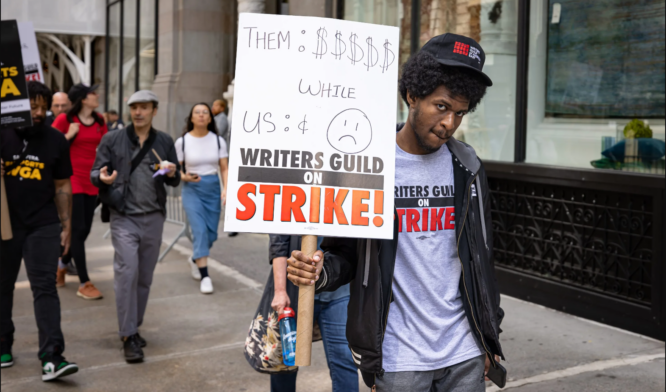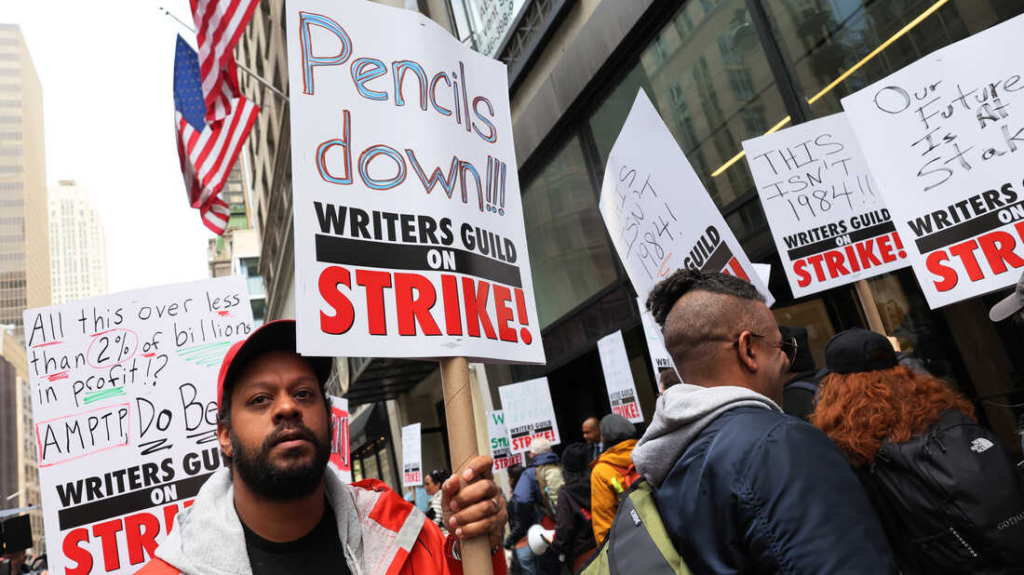
Writers Strike for Entertainment’s Future 2023
The Hollywood writers strike stems from the notion that streaming is not significantly different from traditional TV and movie viewing.
You watch something on a screen—TV, laptop, iPad, whatever. The TV antenna became the cable box, then WiFi, and tight 22-minute time limitations aside, the way people watch TV has changed little in decades.
This is why many entertainment writers on strike see writing as a guarantee of what works and should continue to work. Why modify a system that produced some of the best TV of our lifetimes?

Table of Contents
Uber is the studio executives’ writing future.
Hollywood has “Silicon Valley Fever,” where traditional sectors look at the tech boom and demand the same returns as the main tech stocks, even if they make—and will make—mind-boggling sums of money. Why have one pile of mind-boggling money when you can have two?
Tech’s trenchcoat business model appeals to them. Unions are so annoying. They assume that anything on the internet is a fresh invention rather than a new distribution channel for the same services.
With so many Internet businesses, leadership believed they were disrupting the industry—and ended up redesigning it. Uber invented five buses. WeWork reimagined co-ops. Theranos tested current blood-work devices. Many companies, like Netflix, claim to have revolutionized TV and movies, but they merely don’t want to pay writers as much. Profit growth requires it. One billionaire’s “disruption” destroys thousands of jobs.
After contract negotiations broke down between the Writers Guild of America and the Alliance of Motion Picture and Television Producers, the industry group that represents many studios during collective bargaining, unionized film and TV writers voted overwhelmingly to strike. The strike has halted all late-night programming and production of Abbott Elementary and Stranger Things. No end in sight.
I appreciate their willingness to experiment. However, the system survives because it works.” Teen Wolf writer and Think Tank for Inclusion and Equity co-chair Angela Harvey stated last year.
Many notable writers have echoed it. Television broke. “We’re fixing it,” one negotiator stated. A board member said the WGA saved the studios “from themselves.”
Silicon Valley Fever begins with taking a service, making an app for it, and claiming to have “disrupted” the sector. If an app isn’t appealing, declare your new thing is cryptocurrencies, the blockchain, AI, or whatever’s hot. Remember that “disruption” means uncontrolled, non-union enterprises.
Writers power episodic television. Because everything changes, scripted episodic TV relies on writers. Writers keep shows on track. They are most suited to revise that strategy if something changes. Writers learnt what worked and what they would have to do if they wanted to be producers or showrunners by writing and revising.
No more. Even the most successful showrunners must work to retain writers on set. Writers can work for numerous seasons without generating their own episodes or guaranteeing their return. They may have jobs that don’t match their skills or interests. They can view episodes with their name that are nothing like the screenplay they submitted.
Writers’ salary, especially residuals, is falling, especially for reruns. Between picket lines, WGA-West board member and negotiating team member Adam Conover described it to me.
“If you do what I did, which is make a show for the smallest channel on basic cable and then do the same show for Netflix, the executive producers there told me, ‘Hey, we can pay writers whatever we want. “They have no minimums, no weekly guarantees, we can do whatever we want with writers—those were their exact words,” Conover remarked.
“I’m holding my first residual checks for The G Word, which came out in May of 2022,” he said, alluding to his Netflix program. “My first year of residuals was $500 for the entire series. I got a five-figure residual check from TruTV the first year Adam Ruins Everything aired, right? Checks continue. Because TruTV still airs the show, I earn a couple thousand dollars per year. That pays my show’s writers’ rent.”

Another explanation. The WGA’s MBA’s Appendix A includes everything except fictitious serial television and movies. Late night, daytime discussion programs, soap operas, sketch comedy—everything. MBA covers classic TV writers. Streaming platform writers are unprotected. No rules apply. Netflix determined Conover and his writers’ residuals.
Netflix should follow TruTV’s guidelines. Pay employees if your company name is a verb.
Silicon Valley Fever stage 2: Grow your user base as soon as possible, regardless of whether it makes sense or is sustainable. This need for corporate expansion has accelerated Hollywood’s efforts to convert writing into a job for working authors.
Shows used to promise a year of labor. Unless you were terrible, another season meant another year of effort. No more. TV writing has grown so unpredictable that writers will pick up writing-room employment when they can, which means they may not return to their own program.
In 2022, Lethal Weapon and Manifest writer Amanda Green said, “The idea now is that nobody comes back because you bounced when the room ended, and you’re three shows in before that show even premieres, because it’s become really hard to string together enough jobs to keep year-round employment.
If you don’t have time to come back for the second season, you don’t receive the same growth chances. You always start over.” The show and writers start again every season.

Writers are blamed for things they no longer control.
Staffing is erratic. Writers’ assistants, script supervisors, and script coordinators often became staff writers, story editors, and executive story editors. They later became co-producers, producers, supervising producers, executive producers, and maybe showrunners.
The present economics of TV writing have made rooms either top-heavy with overqualified professionals taking jobs to survive or bottom-heavy with novice writers, forcing showrunners to take on more work. Harvey noted that mid-level authors are few. How can a staff writer look up when that midsection is taken out?
“You’ll hear, ‘Oh, this room had four upper-levels and a staff writer,’” she remarked. “The squished are in the middle. Three mid-levels will never be mentioned.
It’s self-defeating. Every level contributes varied experience, insight, narrative, and flair to the room. So cutting all those bits yields a lower-quality product.”
Showrunners have noted that a program with less than six writers is unsustainable during the strike. Upper-level authors are too busy to provide the guidance the profession requires.
Rashad Raisani, who wrote Burn Notice and 911: Lone Star, said that before the strike, studios were banking scripts but not greenlighting shows, forcing writers to decide whether to stay available or find another job.
Dig deeper and finance these staffs and carry six authors. Take them. No problem. “And if you guys are planning to hold something you’ve ordered indefinitely, well, that’s your fucking problem,” Raisani replied. If you’re not sure, why order? If so, let those writers work on a successful program.
Shows suffer without authors. “I’ve never seen an adverse reaction from viewers or fans that the writers’ room didn’t predict,” Green added. “Whether the writers’ room cared, right?”
